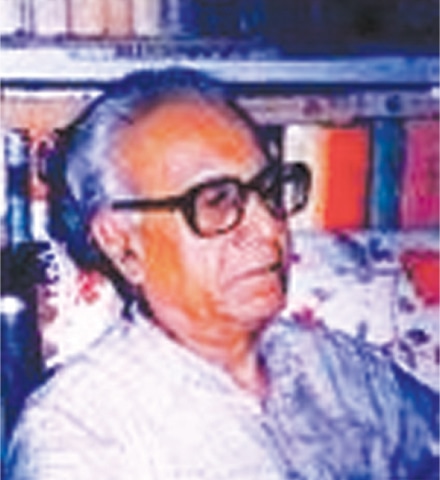
IT is still fresh in my memory.
It was February 2006 and this writer was aboard a flight to Lahore when a fellow passenger unfolded an Urdu newspaper. Unintentionally, my eyes scanned the page and there it was. A brief report on Rasheed Hasan Khan’s death! My heart sank. I felt that I had lost a loved one. Then, for a while, I kept on thinking why I had felt such grief over the death of a person I had never met in my life.
Rasheed Hasan Khan, one of the most celebrated 20th-century scholars of Urdu, was not my relative, not my friend. I was too young to befriend him and too junior to dare initiate any relationship, let alone friendship. He lived in India. And, on top of it all, he was reputed to be a stern, no-nonsense type of person. He was considered highbrow and much respected, in fact, much feared. Even some of the most accomplished researchers and scholars of his time did not dare mess with him.
Straightforward and stringent, Rasheed Sahib would tear to tatters any literary writing that fell short of his high standards, no matter who wrote it, a friend or a foe. That was because he did not seek any approval or rewards. Holding high-ranking posts in literary organisations was never his aim. He did not want to please anyone. He just did not want any material rewards and had no fear, so why would he mince his words?
But all this strictness was limited to his writings. In person, he was courteous and soft spoken. When Rasheed Sahib visited Pakistan to attend a conference and Punjab University’s Urdu department invited him to deliver a lecture, his softer side and pleasing personality was a surprise for many. Behind a stern scholar was a cheerful and friendly common man who laughed heartily when sharing jokes and was glued to TV whenever there was an interesting match of hockey or cricket.
Rasheed Hasan Khan was born in Shahjahanpur, UP, India. His date of birth is often quoted as January 30, 1930, but, as he himself had mentioned in his autobiographical note that was published in a 2002 issue of Bazyaft (Lahore), he was born in December 1925. The record of his precise date of birth was not kept as was common in those days. Rasheed Hasan Khan received his early education at Shahjahanpur’s Madressah Behr-ul-uloom. But he could not finish his Dars-i-Nizami, a course taught at traditional Islamic madressahs, because of his family’s financial problems and had to take up a job at a clothing factory. He was dismissed from the job soon for leading a workers’ strike. Then he did some odd jobs, including one as a munshi at a ration shop. But he somehow continued his education and passed his exams in oriental learning, such as ‘Moulvi fazil’ and ‘Dabeer kamil’. This education in oriental languages such as Arabic and Persian proved to be a great asset in his future research on classical texts.
After a brief stint at a madressah as a teacher, he landed a job at Islamia Higher Secondary School as a teacher of Urdu and Persian. In 1959, Rasheed Sahib went to Delhi and joined Delhi University as a librarian. Later, he became a research assistant at Delhi University’s Urdu Department and thus began his long journey of scholarly pursuits that made him the envy of many, despite apparently a very meagre formal education. He shot to fame with an article severely criticising Faiz Ahmed Faiz’s diction and his “lexical errors”. At that time, Faiz had begun his journey to greatness and had a cult-like following. This article betrayed the shape of things to come and the high literary standards that this courageous scholar had adopted.
Then he so severely criticised the first volume of history of Urdu literature that was being written and published from Aligarh that the book had to be withdrawn from the market and the project was shelved. This naturally earned him many enemies but, as put by Prof Shamim Hanafi, Rasheed Hasan Khan loved the truth more than he loved his own safety.
His books proved that Rasheed Hasan Khan was sincerely meeting the high standards that he had set for others. His books are a testimony to that. Some of the classical works that he meticulously edited and annotated include Bagh-o-bahar, Fasana-i-ajaeb, Gulzar-i-Naseem, Sehr-ul-bayan, Masnaviyat-i-Shauq and Zatal nama. His book Urdu imla is a guide for Urdu orthography and despite some contentious points one has to admit that he was the first to try to reform Urdu orthography on a scholarly basis.
His other works are: Classiki adab ki farhang, Mustalahat-i-thugy, Zaban aur qavaed, Tafheem, Insha-i-Ghalib, and Imla-i-Ghalib. His Adabi tehqeeq: masaael aur tajziya is a practical guide for every researcher of Urdu.
Today, when it comes either to Urdu orthography or Urdu research, Urdu’s textual criticism or editing classical texts, no writing would be considered worth it if it does not mention Rasheed Hasan Khan’s name.
Rasheed Hasan Khan died on Feb 26, 2006, in Shahjahanpur, India.
Published in Dawn, February 27th, 2018














































Dear visitor, the comments section is undergoing an overhaul and will return soon.